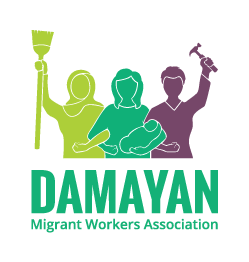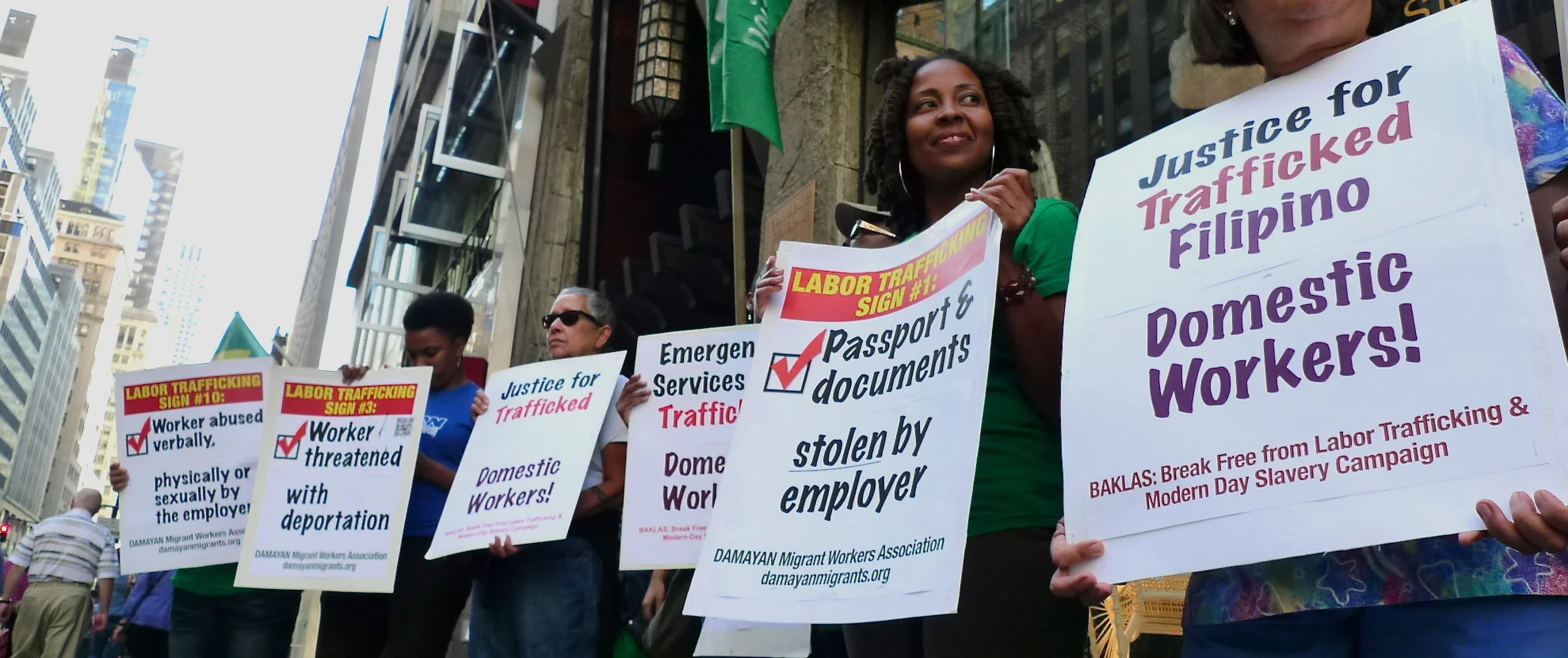Baklas (Filipino word for “dismantle” and for “break free”) aims to dismantle structures that allow labor trafficking and modern-day slavery of women workers to exist. It also aims to help every enslaved domestic worker to break free.
Modern-Day Slavery in NYC
People don’t think of New York City as a place where modern-day slavery happens. And almost no one imagines that diplomats, who represent governments and who are charged with upholding human rights, would be the very perpetrators of the horrors of trafficking.
But it is precisely because NYC is home to the United Nations and the 2nd largest number of diplomatic missions in the US, after Washington, DC, that incidents of trafficking of domestic workers by diplomats are likely to happen here.
Labor trafficking survivors experience the most inhumane form of labor exploitation. Literally, they are at the bottom of today’s 99%, working double or even triple the amount of legal work hours defined by labor law, from below minimum wage to no wages at all. One example was the case of Dema Ramos, a domestic worker, who was trafficked to the US by a Kuwaiti diplomat, and labored as a domestic worker in the household, where she was forced to work at least 18 hours a day, seven days a week with no days off, for approximately 69 cents per hour.
“I would start working at 6am every day. I found work here so much harder than when I was in Lebanon. There were two of us there; I asked the woman why they did not bring two workers with them to America. She said having two house cleaners in America is not allowed. My workday ends at around 12 or 1 am. Even when I am inside the bathroom my male employer would call me to make a cigarette for him.”
In its 2012 Trafficking in Persons Report, the US State Department reported five allegations of various forms of abuse and domestic servitude by foreign mission personnel. In the previous year, the State Department reported a dozen. Domestic workers are still waiting for the State Department to take action on these and other cases.
WHAT WE BELIEVE IN
Protection for workers and accountability for traffickers. Women workers should be protected instead of protecting diplomat traffickers with immunity.
Systemic problems require systemic-level solutions. Diplomats’ home governments should be held accountable, not just individual diplomats. And workers’ home countries should not profit from women sending money home, while working in slavery conditions.
We need organizing and mobilization. Slavery has been illegal for over 100 years. So, we need more than laws and policies. We need a mass movement with trafficked people in the lead, connected and in solidarity with other people’s movements.
This is an issue of women’s leadership and women’s resilience. Domestic servitude and all forms of trafficking disproportionately affect women and is a major issue of concern for the women’s movement. We believe that domestic work, and all women’s work, should be valued, and are working to build a movement that centers women’s stories of strength and victories.
Points Of Unity
We demand that the U.S. State Department revoke diplomatic immunity from government officials who perpetrate labor trafficking and severe exploitation.
We demand that the U.S. State Department suspend countries whose diplomats traffic women workers in the A-3 and G-5 visa program.
We demand protection of immigrant workers through a broader definition of labor trafficking, to more accurately reflect the spectrum of labor exploitation experienced in our communities.
We demand the enforcement of labor laws in the homes of diplomat, corporate or consular employers.
We demand the Philippine Consulate create a task force to address trafficking of domestic workers and to provide resources for exploited workers.
Background
In the US, there is a continuing and greater need to organize and advocate for domestic workers, particularly trafficked women workers. Most domestic workers remain excluded from basic labor laws – though organizing victories in New York, Massachusetts, California and Hawaii have won some basic labor standards. Still, problems in the industry and in the community persist. There is a low level of worker and employer awareness and education on domestic worker rights. Lack of just immigration reform is a serious problem. Most of the workforce members are undocumented, have been separated from their families and are suffering from immigration related discrimination at their workplaces. In addition to work-related abuse, domestic violence cases are also common among women domestic workers, who are abused and exploited by their husbands or boyfriends financially and emotionally.
Among domestic workers, trafficked domestic workers experience inhumane levels of labor exploitation, amounting to modern-day slavery. They are forced to work for slave wages with extremely long hours, no days off, fraudulent and false promises, and coercion, including passport theft and threats of deportation. They are abused, disrespected and, in some cases, physically and sexually assaulted. Today, other low-wage workers like hotel and restaurant workers and even teachers are trafficked on US soil. Society’s low regard for domestic work and the women who perform the work, and the isolation of women domestic workers in the privacy of employers’ homes all contribute to the extreme exploitation of trafficked domestic workers.
Accomplishments
In 2011, Damayan Migrant Workers Association launched the Baklas campaign against labor trafficking of domestic and other low-wage workers. Following are our important accomplishments:
Through the DWC, we helped 50 Filipino domestic workers secure financial stability through good-paying jobs.
Assisted with over two dozen trafficking cases, including escape plans, housing, referrals for T visas and T visa derivatives for their children and spouses;
Helped two dozen women experiencing trafficking to escape their traffickers; secure housing; and win T visas for themselves and their families.
Successfully won back stolen wages in labor trafficking cases against three separate diplomats with immunity (former UN Ambassador to the Philippines, current Ambassador for Mauritius, and former senior Kuwaiti diplomat);
Activities
In negotiations with the Philippine Consulate, NY, for a Memorandum of Understanding to create a Task Force on Labor Trafficking that would provide resources for trafficking survivors;
Organized an Interfaith Vigil, March and Rally to coincide with the United Nations General Assembly, 2013, attended by 100 workers and allies;
Organized demonstrations at the following consulates and missions in New York City whose diplomats have trafficked domestic workers: Kuwait, Tanzania, Peru, Mozambique, Philippines.
Regular presenter at the Annual Freedom Network Conference and annual congresses of the National Domestic Workers Alliance and the Interfaith Workers’ Justice;
Presenter at the People’s General Assembly on Migration, Development and Human Rights, World Day of Prayer, and United Methodist Women;
Co-organized a workshop on Extreme Labor Exploitation, attended by workers in the domestic work, restaurant, and farm work industries, 2013;
Presenter at Columbia University School of Social Work, New York University Law School, and University of California, Santa Barbara;
Alliances
In addition to our work through the Baklas campaign, we are an anchor member of the National Domestic Worker’s Alliance campaign to combat human trafficking, Beyond Survival. For more information about labor trafficking of domestic workers, and the impact of our work through Beyond Survival, visit their website: www.domesticworkers.org/beyondsurvival.

